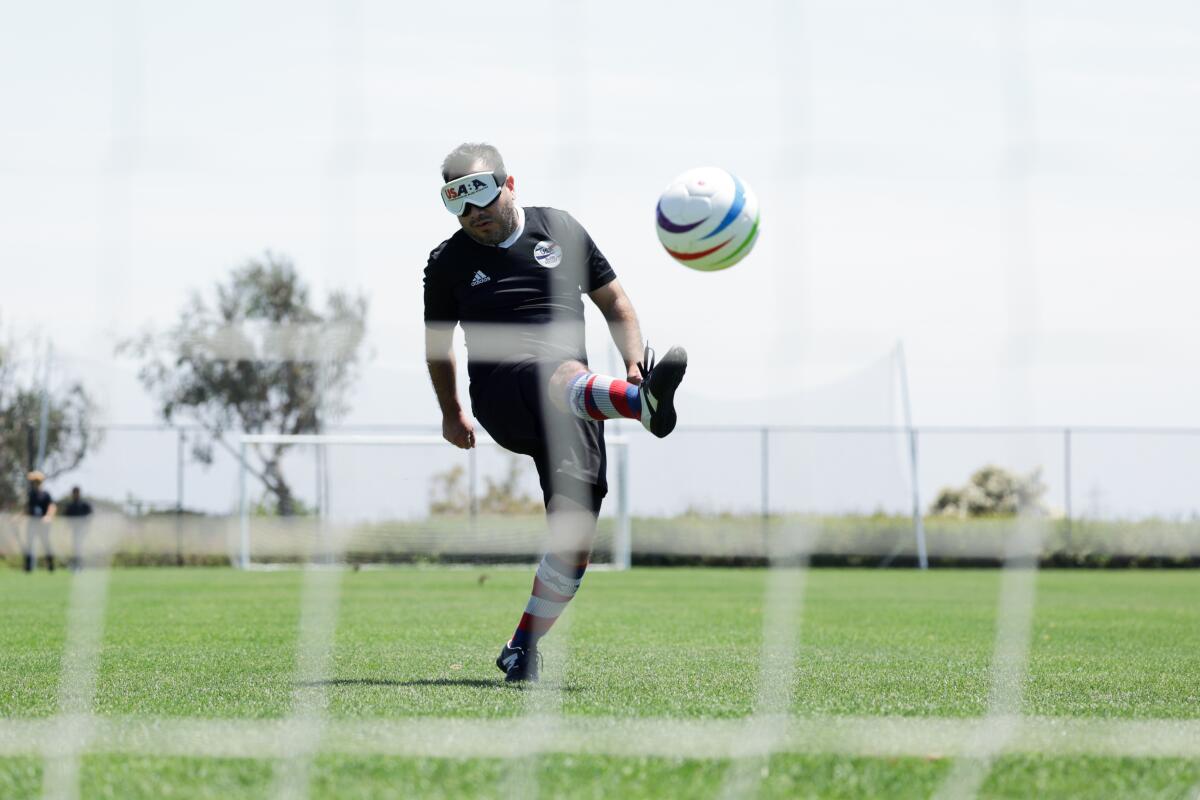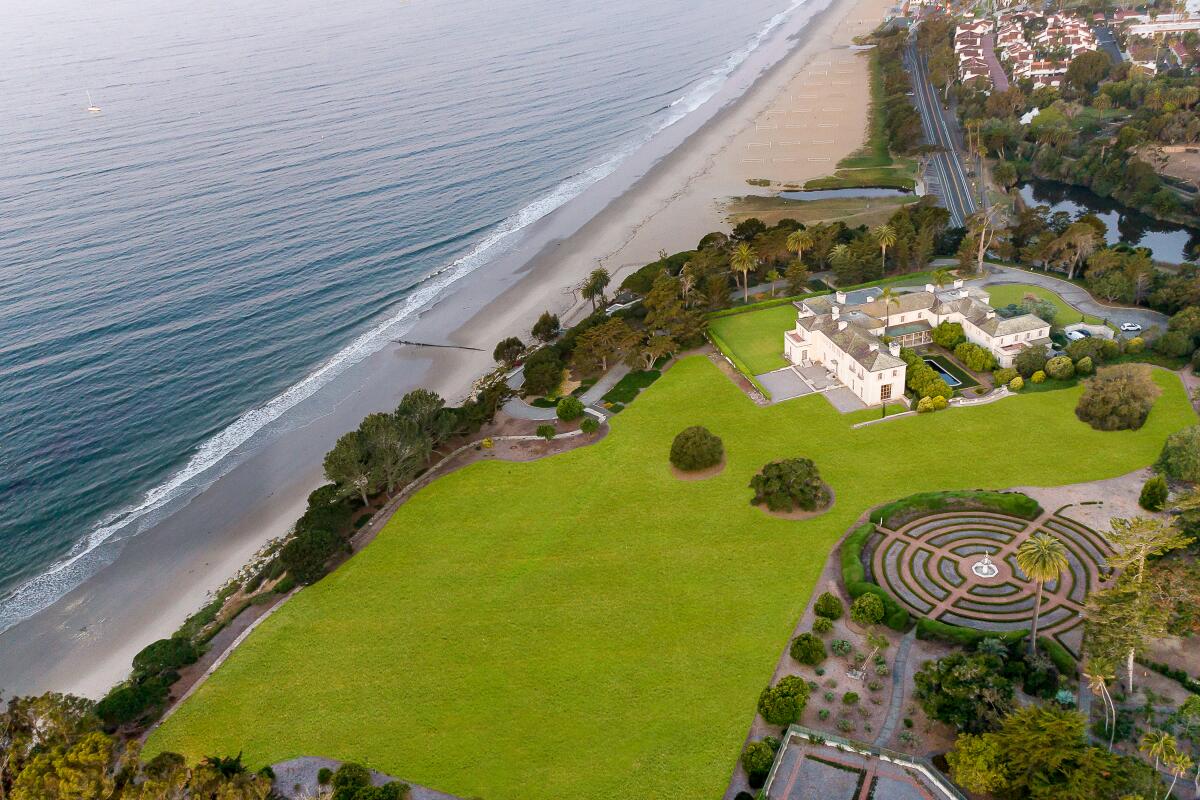Will Labor Day be California’s next big COVID test?
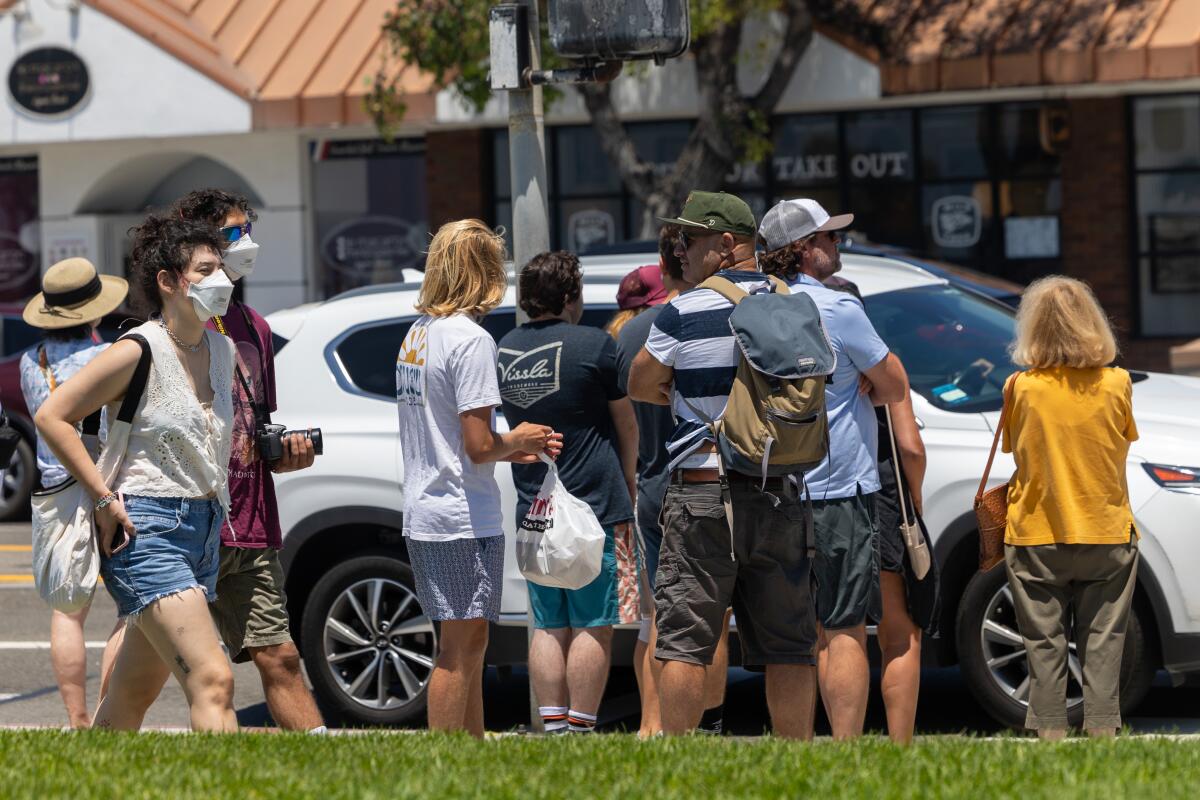
Good morning. It’s Wednesday, Aug. 28. Here’s what you need to know to start your day.
- New COVID vaccines will be ready for the fall. Will Californians be cautious on Labor Day?
- Tom Girardi was found guilty of wire fraud for embezzling tens of millions in client money.
- How to tour a haunting Santa Barbara estate that’s been frozen in time for half a century.
- And here’s today’s e-newspaper.
You're reading the Essential California newsletter
Our reporters guide you through our biggest news, features and recommendations every morning
You may occasionally receive promotional content from the Los Angeles Times.
What to know about the latest COVID surge and the upcoming vaccines
Labor Day weekend is around the corner. As you prepare for a short getaway or a gathering with friends and family, doctors and experts have one request: Protect yourself and others against COVID-19.
Across California and other corners of the country, summer travel is contributing to a COVID surge — the strongest since 2022 in terms of infections. Busy airports and large indoor events, like last week’s Democratic National Convention in Chicago, have expectedly been aiding the spread of the coronavirus.
The Transportation Security Administration said it screened 2.99 million passengers June 23, the most on a single day since the agency’s creation. Similarly high passenger volume has been recorded in Southern California airports.
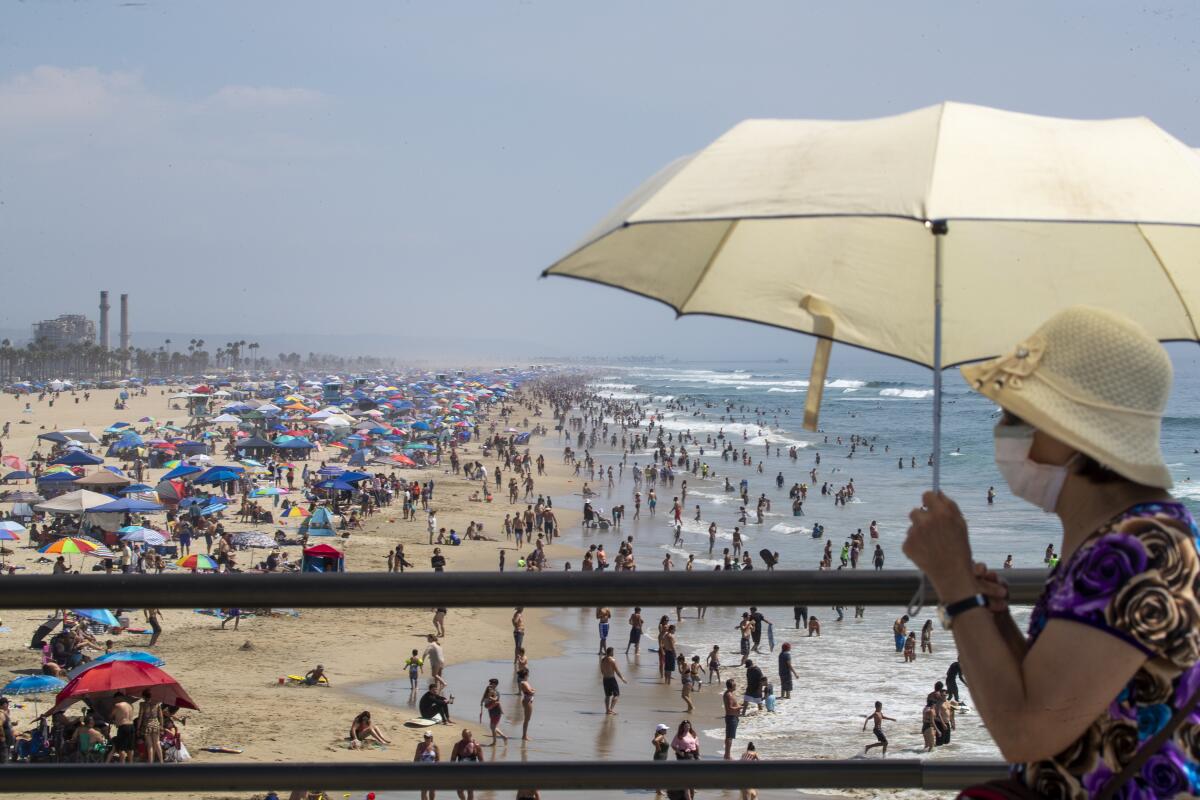
After the DNC, where many events were held indoors, a dozen people from California, including delegates, political strategists and news reporters, said they tested positive.
Amid this vigorous and persistent summer wave of COVID, the U.S. Food and Drug Administration last week authorized the distribution of the updated Moderna and Pfizer COVID-19 vaccines for the 2024-25 season.
The new vaccines are expected to be available as soon as this week, and according to the Centers for Disease Control and Prevention, September and October are the best months for most people to get vaccinated against both COVID-19 and the flu.
How new subvariants are fueling the latest COVID surge
One of the reasons why we have seen several waves of COVID surges throughout this year is the emergence of successive, hyperinfectious coronavirus subvariants. FLiRT, the collective nickname for some of the subvariants that succeeded last winter’s dominant strain and include a strain officially known as KP.2, began a midyear wave.
FLiRT was followed by ever-more-contagious subvariants, nicknamed FLuQE (KP.3) and the latest, nicknamed DeFLuQE (KP.3.1.1).
KP.3.1.1 was “a little different than what people had seen with either natural immunity or with the vaccinations that we had available,” Dr. Elizabeth Hudson, regional chief of infectious diseases at Kaiser Permanente Southern California, told The Times. This made it “much more easy to come into a population” where many people were about a year or more out from their last immunization or COVID-19 illness.
The increased circulation of these subvariants has sickened many Americans, and the rate at which Californians specifically are testing positive for COVID is continually growing.
Some data indicate a slowing of new coronavirus infections in some parts of the country, CDC officials said last week.But we’ll need several weeks of consistent dips in COVID cases before we can say there has been a reversal in the surge.
“Our underlying immunity from prior vaccines and prior infections provides some protection,” CDC Director Dr. Mandy Cohen said. “But we know that protection decreases over time, and certain groups continue to be at higher risk from COVID and other viruses, and we need to continue to protect ourselves and our loved ones.”
How to protect yourself and others
My colleagues Rong-Gong Lin II and Seema Mehta gathered helpful tips for protecting yourself and others. Here’s what you need to know:
- Get vaccinated. The new vaccines have been reformulated with the aim of providing the utmost protection against the most commonly spreading coronavirus variants. The CDC recommends that everyone age 6 months and older, especially those who are immunocompromised or haven’t been vaccinated in more than a year, receive updated COVID-19 and flu vaccines in September or October.*
- Test, daily, if you’re sick. It may take longer after you begin to show signs of illness for a rapid test to show positive. Consider retaking tests daily, up to five days after the onset of cough-and-cold symptoms, Hudson said, because you may still have COVID even if an initial test is negative. Americans will soon be able to register to receive four free tests in the mail, federal officials said.
- Ask for Paxlovid or other anti-COVID drugs if you become ill. Antiviral drugs like Paxlovid reduce the risk of hospitalization and death when taken by people at risk for severe COVID-19 who have mild to moderate symptoms.
- Avoid others until at least 24 hours after your symptoms are getting better and you don’t have a fever and you aren’t using fever-reducing medicine. Stay away from elderly and immunocompromised people for 10 days after you begin to feel sick, the Los Angeles County Department of Public Health recommends.
- Wear a mask and avoid large indoor gatherings. Other general precautions include increasing air circulation by opening windows, turning on air purifiers, adhering to enhanced hygiene practices and preparing a travel health kit.
*You can register for an appointment for the new COVID-19 vaccine at major retailers — including CVS, Walgreens, Rite Aid, Ralphs, Vons, Pavilions, Albertsons and Safeway — already or soon. Kaiser Permanente expects to begin administering the shots by mid-September, and potentially earlier in some locations.
Today’s top stories
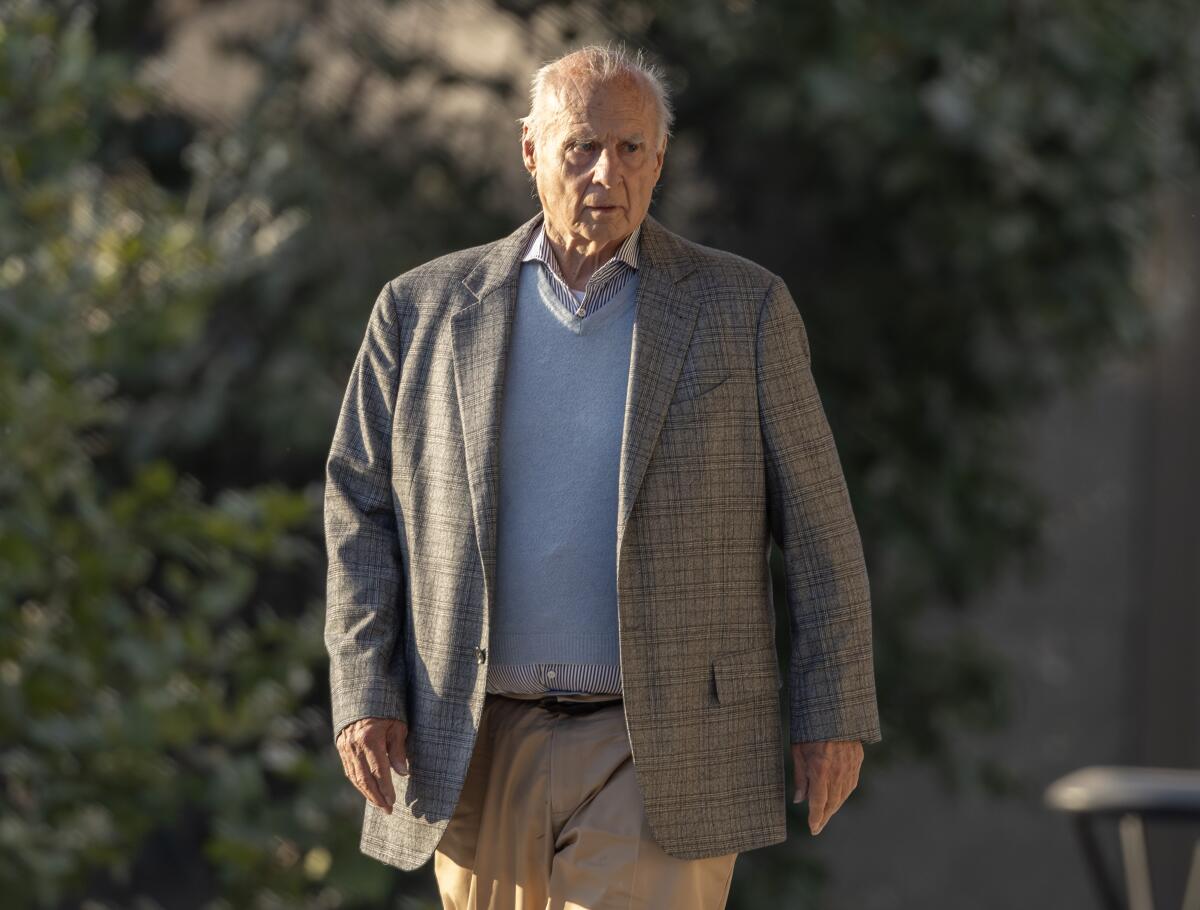
Tom Girardi was found guilty of wire fraud for embezzling tens of millions in client money
- The guilty verdict concluded a 13-day trial in which prosecutors elicited emotional testimony from former clients, including a burn victim and a widow whose husband died in a boating accident.
- Girardi faces another trial next year in Chicago on charges that he and others stole payouts made by Boeing to families whose loved ones died in an Indonesian plane crash.
Teachers raise alarms over the safety of child actors on film and TV sets
- Teachers who work on film and TV productions say the system intended to protect child actors is subject to numerous conflicts and frequently falls short, according to a Times review.
- “It’s just a matter of time before there’s another ‘Twilight Zone’ like situation,” one studio teacher said, referring to the 1982 film set accident in which actor Vic Morrow and two children were killed.
California students return to college amid tighter security over protests
- Colleges and universities across the state are increasing security and enforcing zero tolerance policies for encampments to prevent volatile protests over the Israel-Hamas war.
- A test of these restrictions will come Thursday, when Bay Area students plan to hold coordinated protests at UC Berkeley, San Jose State University, San Francisco State University and the University of San Francisco.
Men’s Central Jail in L.A. could be a death trap in the event of an earthquake, according to a report
- The aging building has major structural problems, including weak walls and concrete so brittle it could crack or shatter under pressure, according to a newly resurfaced engineering study from 2006.
- Like much of downtown, the jail sits on top of the Puente Hills thrust fault system, which experts say is capable of producing a powerful magnitude 7.5 earthquake.
More big stories
- More than 1.5 million donors opened their wallets for the first time in July to support Vice President Kamala Harris, a Times analysis found.
- Gov. Gavin Newsom signed two bills aimed at making a dent in the housing and homelessness crisis.
- Matthew Perry was exploited by medical professionals and street dealers before his death, federal prosecutors say.
- U.S. officials awarded California nearly $150 million to build thousands of charging ports for electric vehicles.
- Disney’s new mega-neighborhood is taking shape in the California desert.
Get unlimited access to the Los Angeles Times. Subscribe here.
Commentary and opinions
- Robin Abcarian asks, “Are Kamala Harris’ Democrats taking back the flag-waving patriotism claimed by Republicans?”
- The weight-loss drug revolution exposes the weakest links in our healthcare system — drug pricing and insurance, Michael Hiltzik writes.
- Here’s how bringing back the woolly mammoth could save species that still walk the Earth, Matt James and Barney Long write.
Today’s great reads
As the 2024 Paralympic Games begin in Paris today, visually impaired parathletes share how they rely on sound and touch to know when to kick a soccer ball or when to time a long-jump leap.
“Running towards a sound you cannot see, it’s challenging, it’s difficult,” long jumper Lex Gillette said. “But it’s really awesome.”
Other great reads
- Caltech, long a bastion of male STEM students, enrolled an undergraduate class of majority women this fall for the first time in its 133-year history.
- A Compton native and academic legend tells his story to a new generation.
How can we make this newsletter more useful? Send comments to [email protected].
For your downtime
Going out
- 🧐 Here’s how to tour a haunting Santa Barbara estate that’s been frozen in time for half a century.
- 👻 Winona Ryder talks about going goth again in ‘“Beetlejuice Beetlejuice,” which hits theaters Sept. 6.
- ⚾ The Dodgers are giving away a second Shohei Ohtani bobblehead doll, but here’s why some fans might not get one.
- 🎢 Teens headed to Fright Fest at Six Flags Magic Mountain will need a chaperone.
- 🎭 “The Civility of Albert Cashier,” a musical based on a trans soldier’s life, opens next week at the Colony Theatre in Burbank.
Staying in
- 🔍 “Only Murders in the Building” returns with a new season poking fun at Hollywood.
- 🎵 John Legend made a kids’ album with Sufjan Stevens.
- 💑 “Love Is Blind: U.K.” is a welcome return to form for Netflix’s hit reality franchise.
- 🧑🍳 Here’s a recipe for a coconut-pina-guava fresca.
- ✏️ Get our free daily crossword puzzle, sudoku, word search and arcade games.
And finally ... a great photo
Show us your favorite place in California! Send us photos that scream California and we may feature them in an edition of Essential California.
Today’s great photo is from Lorraine Opper of Los Angeles and Sacramento: the American River running through Sacramento, which is “a beautiful place to walk or ride a bike.”
Lorraine writes: “There is nothing like an early morning ride watching birds, deer, coyotes or people.”
Have a great day, from the Essential California team
Ryan Fonseca, reporter
Defne Karabatur, fellow
Andrew Campa, Sunday reporter
Hunter Clauss, multiplatform editor
Christian Orozco, assistant editor
Stephanie Chavez, deputy metro editor
Karim Doumar, head of newsletters
Check our top stories, topics and the latest articles on latimes.com.
Sign up for Essential California
The most important California stories and recommendations in your inbox every morning.
You may occasionally receive promotional content from the Los Angeles Times.
